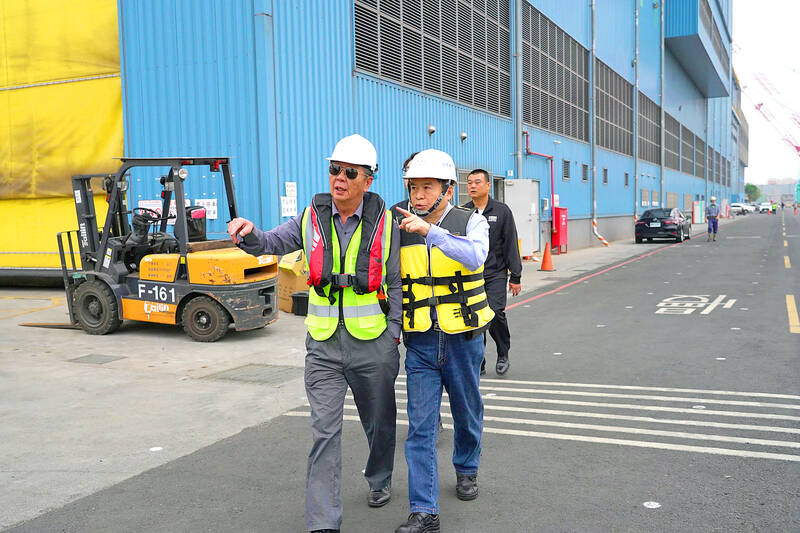Retired navy admiral Huang Shu-kuang (黃曙光) is to remain a National Security Council (NSC) adviser and the convener of the Indigenous Defense Submarine (IDS) program after the new administration is sworn in on Monday next week, the presidential handover committee said on Tuesday.
Huang, who tendered his resignation as NSC adviser and IDS program convener last month, decided to stay on after President Tsai Ing-wen (蔡英文) and president-elect William Lai (賴清德) asked him to do so, a source with knowledge of the matter said.
Tsai and Lai both have strong faith in Huang, and the incoming president asked him to continue overseeing the major project to bolster the nation’s defense capabilities, the source said.

Photo: CNA
Huang said in a statement last month that he had resigned in hopes that it would end “politically charged, unfounded accusations and slander targeting the IDS program.”
Tsai did not approve his resignation, and he has since been supervising the testing of the prototype submarine the Hai Kun (海鯤), or “Narwhal,” at a CSBC Corp, Taiwan facility, the source said.
The first military officer to be promoted by Tsai to the rank of admiral second class, Huang served as navy chief from June 2016 to January 2020, when he was named chief of general staff.
His primary mission under the outgoing president has been to push the IDS program forward. In September 2021, Tsai appointed him as an NSC adviser and designated him convener of the IDS program.

Taiwanese can file complaints with the Tourism Administration to report travel agencies if their activities caused termination of a person’s citizenship, Mainland Affairs Council Minister Chiu Chui-cheng (邱垂正) said yesterday, after a podcaster highlighted a case in which a person’s citizenship was canceled for receiving a single-use Chinese passport to enter Russia. The council is aware of incidents in which people who signed up through Chinese travel agencies for tours of Russia were told they could obtain Russian visas and fast-track border clearance, Chiu told reporters on the sidelines of an event in Taipei. However, the travel agencies actually applied

Japanese footwear brand Onitsuka Tiger today issued a public apology and said it has suspended an employee amid allegations that the staff member discriminated against a Vietnamese customer at its Taipei 101 store. Posting on the social media platform Threads yesterday, a user said that an employee at the store said that “those shoes are very expensive” when her friend, who is a migrant worker from Vietnam, asked for assistance. The employee then ignored her until she asked again, to which she replied: "We don't have a size 37." The post had amassed nearly 26,000 likes and 916 comments as of this

New measures aimed at making Taiwan more attractive to foreign professionals came into effect this month, the National Development Council said yesterday. Among the changes, international students at Taiwanese universities would be able to work in Taiwan without a work permit in the two years after they graduate, explainer materials provided by the council said. In addition, foreign nationals who graduated from one of the world’s top 200 universities within the past five years can also apply for a two-year open work permit. Previously, those graduates would have needed to apply for a work permit using point-based criteria or have a Taiwanese company

The Shilin District Prosecutors’ Office yesterday indicted two Taiwanese and issued a wanted notice for Pete Liu (劉作虎), founder of Shenzhen-based smartphone manufacturer OnePlus Technology Co (萬普拉斯科技), for allegedly contravening the Act Governing Relations Between the People of the Taiwan Area and the Mainland Area (臺灣地區與大陸地區人民關係條例) by poaching 70 engineers in Taiwan. Liu allegedly traveled to Taiwan at the end of 2014 and met with a Taiwanese man surnamed Lin (林) to discuss establishing a mobile software research and development (R&D) team in Taiwan, prosecutors said. Without approval from the government, Lin, following Liu’s instructions, recruited more than 70 software